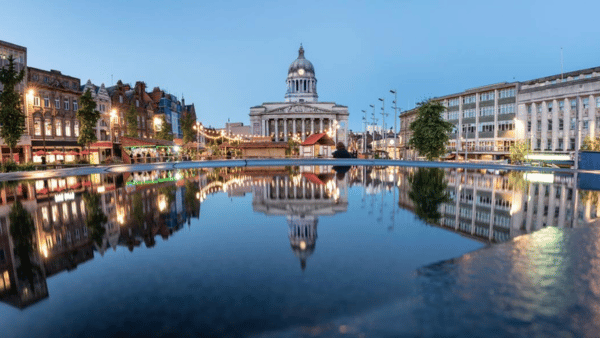A report by the independent RSA think tank has warned that the government cannot assume that it can simply cut back the size of the state and expect ‘communities’ to spontaneously bloom and deliver the aims of the Big Society or to make up for funding shortfalls in the NHS.
Published today in partnership with the London School of Economics and the University of Central Lancashire, Community Capital: The Value of Connected Communities, details the findings of practical research in seven communities around England. One pilot study found that strengthening people’s social networks reduced people’s use of certain health services by up to 34%.
However, with local authorities expecting another round of budget cuts of up to a further 40% at November’s comprehensive spending review, the report said it’s unlikely that public services will have adequate funding to carry out government policy, with councils reduced to focusing on explicit statutory responsibilities like social services, waste collection and concessionary travel.
The report argued that non-statutory duties of public services, such as libraries or leisure facilities, must not be seen simply as ‘soft’ extras that represent easy savings, but as crucial points of collaboration and engagement between the state and communities as well as significant opportunities to prevent problems arising from social isolation.
In a programme funded by the Big Lottery Fund, the RSA and partners have been working across seven different UK sites since 2010 to test how interventions at a local level might encourage deeper social connections that would help improve a community’s resilience and wellbeing. Researchers found that:
- There is evidence that investing in interventions which build social relationships can improve employability, improve health (which has positive economic impacts) and create savings in health and welfare expenditure.
- Social connectedness correlates more strongly with wellbeing than social or economic characteristics such as long term illness, unemployment or being a single parent. In a survey of 2,840 people, the variable most consistently associated with having higher subjective wellbeing was ‘feeling part of a community’.
- 60 per cent of the people surveyed could not name anybody they knew who had the power or influence to change things locally. But by facilitating connections between people and supporting them to feel like socially included citizens, interventions can provide people with new skills and improve their employment prospects.
- Concentrating resources on networks and relationships, rather than on the ‘troubled’ individual as an end-user can have beneficial effects which ripple out through social networks, having positive effects on people’s children, partners, friends and others.
Commenting on the report, RSA researcher, Matthew Parsfield said:
Since David Cameron became prime minister in 2010, the government has repeatedly put forward the assumption that stronger, more civic minded communities can contribute to making life better for local people whether the focus is on policing, libraries, health, the ageing population or people’s happiness and quality of life.
Our research broadly supports this claim – the power of connectivity both within and between communities is there to be realised. However, we must be honest about where the acceptable floor is below which public services do not have adequate funding to make these connections happen or enjoy the associated savings to welfare and health care costs.
Our experience from the Connected Communities programme has led us to conclude that it takes engaged, deliberative, sometimes difficult work to release value from community capital. Effective communitarian public policy requires planning, careful engagement with people, the weaving and brokering of social networks, and ongoing support for communities.
The report recommended that:
- Local authorities, housing associations, and adult social service providers should position their staff or, budget allowing, hire new staff to perform community engagement roles aimed at widening and deepening citizen’s social networks to support greater wellbeing and reduce social isolation.
- Health and Wellbeing Boards and Clinical Commissioning Groups should set aside funding and develop strategic commissioning frameworks which prioritise peer support groups for various patient groups.
- Innovative approaches to identifying and spending new sources of funding should be explored, such as local authorities co-producing community projects with residents using the 15 per cent of Community Infrastructure Levies reserved for neighbourhoods, or through Local Enterprise Partnerships and charitable trusts specifically making small grand funding available for previously.
Notes to editors
- Community Capital: The Value of Connected Communities is the final report of the Big Lottery Funded Connected Communities for Mental Wellbeing and Social Inclusion programme, which ran from 2010 to 2015.
- Between 2010 and 2015, researchers from the RSA, LSE and UCLan worked with statutory and third sector partners in seven locations around England to understand community connections and to pilot new projects aimed at bringing people together to improve wellbeing. The seven sites were Murton, County Durham; Toxteth, Liverpool; Tipton, Sandwell; Bretton, Peterborough; New Cross Gate, Lewisham; Knowle West, Bristol; and Littlehampton, West Sussex.
- To find out more contact RSA Head of Media Luke Robinson on luke.robinson@rsa.org.uk or call 020 7451 6893 or 07799 737 970
Related news
-
Groundbreaking commission to supercharge East Midlands launched
The RSA and the East Midlands Combined County Authority have launched the Inclusive Growth Commission, which will identify and action radical plans to unleash potential and supercharge prosperity in communities across the East Midlands.
-
Landmark new report to unleash potential of UK as a creative superpower
The RSA, Arts Council England and the Creative PEC have launched a new report setting out a bold vision for the UK’s creative industries unlocking tens of billions of pounds in economic potential and cementing the UK’s reputation as a creative superpower.
-
‘Muse’ at RSA House: the new cocktail oasis tucked away behind the bustling strand
The new luxury cocktail bar will open its doors this November, serving sustainable, British cocktails in collaboration with Idyll Drinks.



Be the first to write a comment
Comments
Please login to post a comment or reply
Don't have an account? Click here to register.